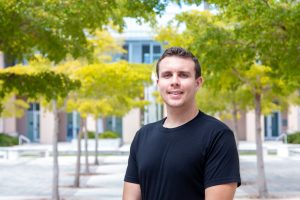NCF scholar Joshua Ingram aims for the stars

With New College as his launching pad, thesis student Joshua Ingram’s out-of-this-world research is now gaining national momentum.
He just earned second place in a major project competition for his analysis of solar flares. He is interning at some of the world’s most prestigious scientific institutions. And his academic discoveries are graduate-research-level groundbreaking.
“Using observations made by the GOES satellites operated by NASA and the NOAA, I studied how often solar flares occur throughout the 11-year solar cycles and within different active regions in the solar corona. Astrophysicists typically model the way in which these flares occur using some form of a random Poisson process model, but the results of my statistical analysis challenge its validity,” said Ingram, who is studying statistics and applied mathematics, and is the co-president of the Astronomy Club. “I showed that some of the fundamental assumptions made when utilizing this modeling approach are broken, gave an explanation of what might be going on, and presented several questions that must be investigated to better understand how solar flares occur.”
To the layman, Ingram’s research may seem like a lot to comprehend. And that’s because it is. But Ingram finds a way to make it universally accessible. Ingram is the type of scholar who merges magical wonderment (a fascination with the sky and the stars) with incredibly hard work (putting his pedantic pen to paper with rock-solid facts and compelling arguments).
His latest award-winning research project (a portion of his undergraduate thesis, which he defended during his third year), is entitled, On the Generative Process of Solar Flares: Non-Poisson Behavior, and it exemplifies Ingram’s scholarly prowess.
The judges of the recent Spring 2021 Undergraduate Statistics Project Competition (USPC)—an event for undergraduate statistics and data science students, sponsored by the American Statistical Association (ASA) and the Consortium for Advancement of Undergraduate Statistics Education (CAUSE)—took notice and awarded him with second place.
“This event was very competitive, from my understanding, with a considerable amount of submissions from undergraduate students from universities all around the United States,” Ingram said. “It’s really uplifting to see my work recognized at this scale, even though I’m just an undergraduate student.”
New College Professor of Statistics Bernhard Klingenberg, Ph.D., Ingram’s faculty sponsor, encouraged him to compete. Submissions that were understandable to readers who were not necessarily statistics experts were especially favored by the judges. Ingram has spent plenty of time inside and outside of the New College classroom, honing his writing and researching skills.
He is currently a research intern at the Harvard & Smithsonian Center for Astrophysics (through December 2021) and the National Aeronautics and Space Administration (NASA) Goddard Space Flight Center Astrophysics Science Division (through May 2022). Ingram has also interned with the NASA Hubble Space Telescope Team at Goddard. All of these experiences contributed the foundation of his New College thesis research.
“A lot of my thesis work originated from research on solar flares I started as an intern in an REU [research experience for undergraduates] during the summer of 2020 at the Harvard-Smithsonian Center for Astrophysics,” Ingram said. “I modeled the waiting times and counts of flares across solar cycles, and within active regions, using a Poisson process model. I also developed a statistical model that fits a discounted power-law to the observed distribution of solar flare total energy releases. I tested the performance of my model using simulations and even conducted a power analysis of several goodness of fit tests I utilized in my work.”
Professor of Mathematics Necmettin Yildirim, Ph.D. served on Ingram’s thesis committee in May and continues to champion his research.
“Josh’s thesis work constitutes interdisciplinary cutting-edge research, which is a nice blend of statistics, mathematics and astronomy,” Yildirim said. “His national accomplishment [in the USPC] is the fruit of hard work and the endless dedication of Josh in doing interdisciplinary research, which may often be challenging. I can say that, without doubt, bright futures are ahead of him.”
Ingram’s opportunities at New College have been integral to his success, he said.
“All of my professors have been nothing but supportive of my efforts. They have encouraged me to push myself in my academics and have influenced me to be very inquisitive and skeptical about our data-driven world,” Ingram said. “Without their support, I definitely would not have gone as far as I have, academically and in my research, especially during the past year or so during the pandemic. They’ve impacted the way that I think, approach problems, and learn about new topics, even when I’m not sure I have what it takes at first.”
On top of that support, Ingram is also earning his bachelor’s degree debt-free due to New College’s affordable in-state tuition and fees, and he is the first person in his family to earn a degree.
“In addition to its affordability, New College has amazing STEM programs and so many professors excited to help students succeed. Because of our low student-faculty ratio, I’ve been able to develop lasting relationships with amazing professors and staff members. I have several mentors that push me to fulfill my potential and support me in achieving my goals in research, resulting in invaluable research experiences at Harvard and NASA,” Ingram said. “I believe going to New College was one of the best decisions I’ve made. New College is the school to go to if you’re willing to be an independent thinker, are self-driven and like to make things happen. Now I’m working towards my dream to go to graduate school and dedicate my life to research.”
Abby Weingarten is the senior editor in the Office of Communications & Marketing.
